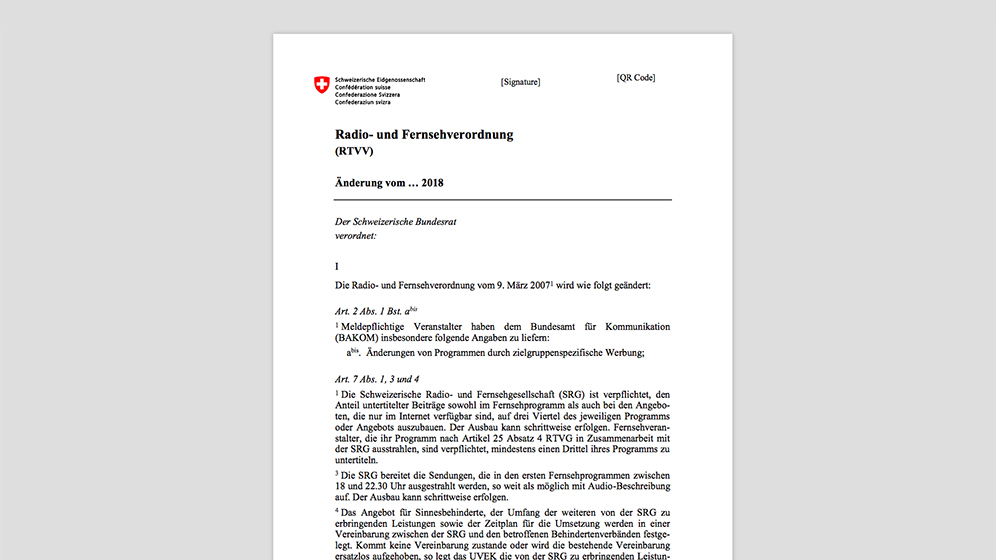Target group advertising comes in for criticism in RTVV revision
The revision of the Radio and Television Ordinance (RTVO) has met with little approval. Almost all stakeholders do not agree that fee-financed companies should be allowed to broadcast targeted advertising. Those parties that are in favor of supporting the SDA impose conditions: Public money should not end up in shareholders' pockets.

One of the decisive innovations in the revised RTVO is the possibility for SRG and the licensed broadcasters to address target groups directly with their advertising. Of the total of twelve advertising minutes allowed per hour, this new method is to be permitted for four minutes. The responses in the consultation for the partial revision, which ended on Friday, show that this change is rejected by the conservative parties.
SRG too heavily favored
In its presented form, the project convinces neither the Green Liberals (GLP) nor the SVP and FDP. All three fear that private media players would be subjected to unlawful competition. They would then have less of the advertising pie.
For the Free Democrats, there is no reason to further strengthen the "already dominant position" of the SRG by pulling the rug out from under the feet of the private media. The GLP also believes that the introduction of targeted advertising would only benefit the SRG because the small private media would not be able to exploit this potential at all due to their size.
For the Swiss Trade Association (SGV), the revision is not going in the right direction. SGV President Jean-François Rime criticized on the platform Moneycab that the Federal Council could not promise to redimension the SRG and at the same time allocate it new tasks and thus funds. The CVP had not yet issued a statement as of noon on Friday.
Bad timing
The Greens are also very skeptical. Like the Swiss Federation of Trade Unions (SGB), they fear that privacy could be attacked. The licensed broadcasters would evaluate user data more in order to be able to sell targeted advertising. Fee-financed programs should not be "commercialized" - this would contradict the mandate for public service. After all, it is not the consumer who is the target audience, but the citizens.
The SP does not categorically rule out target group advertising, but suggests that the advertising niches of the regional stations should not be touched. The revision would have to be changed so that target group advertising is not defined geographically.
For a majority of the parties, the consultation comes too early: First, a fundamental debate on public service must be held. And the result of the vote on the No Billag initiative on March 4 should also be awaited.
Furthermore, the Federal Council's recommendations should not be enforced via ordinance, but within the framework of the new Electronic Media Act, which is currently being prepared.
Support for the SDA or not ?
Another weighty point of the revision is the possible financial support of the Swiss Dispatch Agency (sda) by the federal government. Several cantons (including Basel, Bern, Solothurn, Vaud and Fribourg) support this proposal. The sda, which was also asked, did not comment.
The parties have very different views on the subject: On the right, it is "niet" (SVP), "rather no" (FDP), "why not" (GLP) and "of course" (BDP). The CVP does not take a position because of the "current situation" with the SDA.
The left and the unions think that a national news agency should be supported via a performance agreement. However, this has not yet been clearly defined. In any case, it should be ensured that a federal contribution flows into the development of journalistic services and not into the pockets of shareholders.
The revision of the RTVO also provides for other changes, which were approved by a large majority. They include the protection of minorities and the proportion of subtitled broadcasts in the overall program, which is to increase in the coming years. (SDA)








